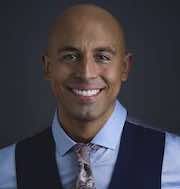 Hailing from critically acclaimed dramas such as American Crime, Moisés Zamora is no stranger to the unique mix of talent, luck, and hard work that form the bedrock of a solid writers’ room. Still, the Mexican-American creator, whose company, Zone One, has a stated mission to elevate Latin-American, Indigenous, and Afro-Latino stories, seized on a moment to tell the tale of the groundbreaking musician Selena Quintanilla Perez: and did so with a writer’s room reflective of not only the world in which we live but the culture from which the Quintanilla family hailed.
Hailing from critically acclaimed dramas such as American Crime, Moisés Zamora is no stranger to the unique mix of talent, luck, and hard work that form the bedrock of a solid writers’ room. Still, the Mexican-American creator, whose company, Zone One, has a stated mission to elevate Latin-American, Indigenous, and Afro-Latino stories, seized on a moment to tell the tale of the groundbreaking musician Selena Quintanilla Perez: and did so with a writer’s room reflective of not only the world in which we live but the culture from which the Quintanilla family hailed.
SELENA: THE SERIES, PART 1 (now available on Netflix) wrestles with the complexities of the American dream, from the perspective of a family navigating the fallout of the 1980s oil crisis, the Tejano music scene, and racial identity in the early 1990s. In an era where the portrayal of cosmopolitan cities like New York was either racially problematic or absent minorities altogether, and when the five top-grossing films featured not a single Latino/Latinx/Hispanic character, Selena’s seemingly effortless stardom and her breakthrough best-selling album Amor Prohibido shone brightly against a backdrop of an America used to overlooking Latino voices. Zamora came into the project with first-hand knowledge of Selena’s impact, saying in an interview with the AV Club:
“I knew how important Selena’s story was—not just for me, but for a lot of Latinos in the United States and Latin America—and how her legacy goes on…We did our best to be as authentic as possible, to match the spirit of Selena. She was really sweet and compassionate, and she held those values throughout her life. I do feel that’s why she is still loved, because she was that kind of authentic, genuine person while being a superstar—just a regular woman with dreams.”
Selena’s cultural impact, as a working-class singer from a state with a deeply troubling racial history, whose culture and artistry was one and the same, has had lasting impacts on both Latinx artists and the conversation surrounding the US Hispanic population in film, music, and politics. It also inspired the 1997 biopic credited as the breakout role for Jennifer Lopez, who has become a trailblazer in her own right and is one of America’s most popular and prevailing Latina film stars. Zamora, in staffing a writer’s room with folks who were shaped directly by Selena’s career and tragic death, has set a standard for future showrunners.
Lived Experience Wins
Selena: The Series has already been applauded for a writer’s room full of diverse talent. Latinx Texas-natives like Pamela Garcia Rooney and Raymond Arturo Perez, as well as Telemundo veterans like Claudia Forestieri round out a room that showcases the diversity within the fastest growing population in America. Within those rooms, the voices uniquely impacted by Selena’s fame can channel that emotional connection into creativity, and draw from the lived experience of their formative years. As Zamora expressed in an interview with Decider:
“Everybody coming in, having that relationship already with Selena—because we either grew up with her or got to know her later, or whatever that relationship was—it really made a difference, because everyone put 150 percent of themselves. It was emotional. And it was heartfelt. The writers and directors went above and beyond. As well as the cast— they just put everything in. Because everyone has that kind of relationship with Selena and her music, and her story.”
Even with a slew of impressive pedigrees among his writers, Zamora betting on that lived experience is a noteworthy strategy for showrunners looking to boost representation in their rooms. The majority of television writers continue to be cisgender white men; the inequity of opportunities yielded by working within an exclusive industry set writers from diverse backgrounds at a disadvantage in terms of access and networking. In short, experience on paper is only a small part of the consideration showrunners should make in staffing their rooms. As the industry pursues gender and racial parity in fits and starts, individual showrunners can sidestep one known recruitment pitfall by following Zamora’s lead.
The Myth of the Monolith
One could broadly describe the writer’s room of Selena: The Series as “Latino” or “Latinx”; but as almost anyone who checks that box on a census can tell you, the word fails to encompass the broad spectrum of Americans hailing from South America, Mexico, Spain, and the Caribbean. This fraught generalization has been the topic of much post-election discussion, with pundits endlessly perplexed that Cuban immigrants in Miami might vote differently than Chicano Americans in East LA; however, the deeper issue of tokenism as it pertains to Hispanic and Latinx inclusion in the writer’s room can be easily avoided by following Zamora’s lead.
“… I’m dedicated to put in the work to open the door and give more opportunities to Indigenous/Latin descent. The stories about ourselves, anyone can relate to them, as you can see from Selena.” – Moisés Zamora, Cinema Blend.
Zamora’s intersectional and geographically diverse team of mostly Latinx writers carries on the lesson that Selena taught the world: the Latino story is the American story. Recruiting piecemeal from what is wrongly perceived as a Latino Monolith is a means of marginalization: the pressure of representing an entire people group overshadows the opportunity to benefit from an individuals’ unique perspective. Zamora understands that true inclusion is about holding space for the nuances of cultural perspective––and that stories about family, dedication, and sacrifice are universal.
Enjoy this great interview that Dominique Nieves does with Moisés Zamora:
 Joshua Noble is a Puerto Rican writer, actor, and producer based in Los Angeles, California. In addition to his career in TV and film, he is a founding producer of The American Playbook, a series of conversations and new works highlighting historically underrepresented voices, and currently serves as Director of the National Actors’ Retreat. Joshua received his MFA from the Yale School of Drama.
Joshua Noble is a Puerto Rican writer, actor, and producer based in Los Angeles, California. In addition to his career in TV and film, he is a founding producer of The American Playbook, a series of conversations and new works highlighting historically underrepresented voices, and currently serves as Director of the National Actors’ Retreat. Joshua received his MFA from the Yale School of Drama.
For all the latest from WeScreenplay, be sure to follow us on Twitter, Facebook, and Instagram.
















